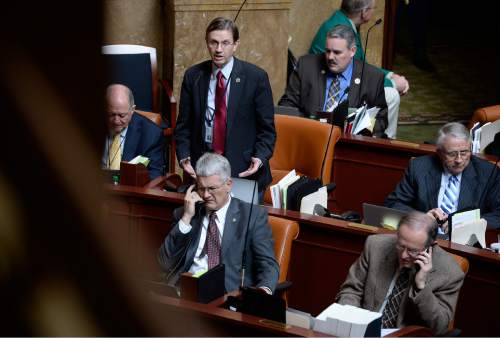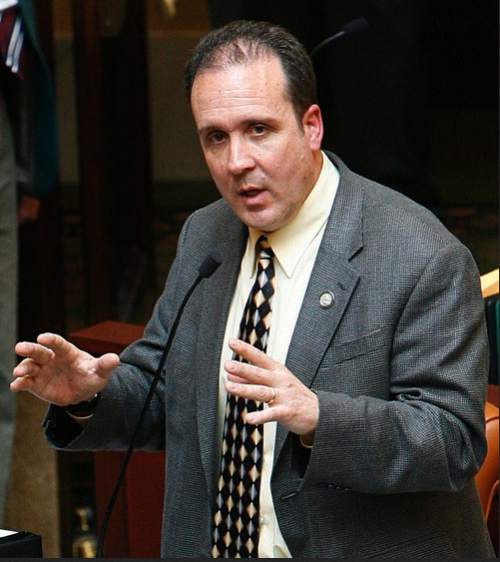This is an archived article that was published on sltrib.com in 2015, and information in the article may be outdated. It is provided only for personal research purposes and may not be reprinted.
The Utah House welcomed 15 freshmen this year, one of every five of its total 75 members. But as they say on Sesame Street, three of those freshmen are not like the others.
Reps. Brad King, D-Price, Brad Daw, R-Orem, and Fred Cox, R-West Valley City, are veterans of Capitol Hill, having served a combined 22 years.
So it's a little unusual to see them invited to special freshman meetings with the House speaker, going to freshman orientation or even being sworn in with the newbies.
Each has a different reason for returning.
Daw wanted to reverse what he says was a dirty campaign that ousted him two years ago. King wanted Democrats to win back the only seat his party holds outside of Salt Lake County. Cox says he simply missed serving, and wants to make a difference.
—
Daw • He previously served eight years. Then, in 2012, he pushed legislation to restrict the payday lending industry — and even though the bill failed, the industry punished him for it in what became a central part of scandals that toppled former Attorney General John Swallow.
House investigators say payday lenders secretly funneled money to Swallow through political action committees he controlled. Some of the money went into Swallow's GOP primary race, but $100,000 was used in a nasty mail campaign against Daw.
"I didn't like the way I exited," Daw said. "It was an opportunity to return and let people know those kinds of things don't prevail. They may win for a short time, but they don't prevail."
He again is pushing his bill to regulate payday lenders — whose Utah loans now average 466 percent annually. HB144 would require them to create a database of all payday loans, and then limit the number a borrower could have at one time — an attempt to stop people from taking out loans from one company to pay another.
"It's been important to me," he says of the bill. "The more I work it, the more I see the need for it. I have more and more people coming to me saying, 'Please run this, we see all kinds of abuse.' "
Daw adds, "It feels like I never really left. I love this process. I love that we as a people can choose our elected officials, and we [legislators] can come up here and make a difference for them."
—
King • The Price Democrat served 12 years from 1997 through 2008, and was the House minority leader when he left seven years ago to run unsuccessfully for the state Senate. His party lost his seat in 2012 — ending any Democratic rural representation in the Legislature.
So he said he ran last year to help the party win it back, but only after he couldn't find any other willing candidate.
"I spent some significant time trying to find someone to run," he said. "But in a rural area … finding someone who has the right set of circumstances to be able to serve in this body is a difficult thing." It's hard, he noted, to take off six weeks from most jobs.
King had just retired after 33 years as an administrator at Utah State University-Eastern. "I felt like I had some tread left on my tennis shoes," he said. "I enjoyed my service here."
He said he returned "to represent my constituents," and help others understand rural issues.
"I don't have a real strong ideological bent. I am a moderate conservative Democrat," he says. "I feel like I play an important role in my caucus, giving that perspective to what has become a very urban caucus. I used to have a few [Democratic colleagues] outside Salt Lake County, now I'm the only one."
He likens returning to the Legislature, where many of the faces are the same to TV's Cheers bar. "It nice to go where everybody knows your name."
—
Cox • The West Valley City Republican had served just two years previously, after being appointed to the House to fill a vacancy. In 2012, reapportionment put him in the same new district as an incumbent Democrat, and Cox lost a close race.
He ran again last year. On election night, the preliminary vote count had him losing another close election. But after all the by-mail ballots were counted a couple weeks later, Cox came out the winner.
"I did miss it," Cox says about his service.""I do feel like I can make a difference. I found that sometimes a question can make a difference on whether a bill passes or fails."
Cox adds that he spends several hours a night reading all the bills that he may be asked to vote on the next day. Sometimes that keeps him up to the wee hours.
A full-time architect, Cox said it's tough taking the time out to be a legislator. "I've got some clients looking for a drawing, and sometimes I can't answer the phone and have to email them later."
But he said the rewards of public service — though not the financial ones — make it worth it. "I feel if we don't have somebody standing up for our rights, they disappear."





